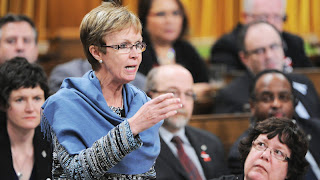 |
| Nycole Turmel speaking during Question Period in the House of Commons |
Numbers were floated by Mr. Harper at the Davos conference, although I don't think there was a lot of thought and research on those numbers by our Prime Minister. It just seemed to him like changing the eligibility from 65 to 67 years of age would make sense, thus it was the numbers he floated in front of other major world leaders.
But, naturally, the Official Opposition led by the New Democratic Party of Canada jumped on the chance to have yet another point on which to grill the Harper Conservatives in the House of Commons. Despite the fact that the entire Conservative cabinet have stated again and again that changes (if there will be any) to OAS won't take affect for many years, if not a decade or more, the NDP has made it look like the Prime Minister would like to enact these changes tomorrow, affecting "poor seniors" today as they try to make ends meet.
A really interesting article by Hugh MacIntyre in the National Post highlights the steps being taken by the NDP to extend their appeal to those who are currently 65+ using the controversy about OAS.
Basically, the NDP are taking the OAS controversy on the road to many communities throughout Canada in an attempt to become more appealing to the older generation, a generation that largely ignored the NDP during the election this past Spring.
The problem lies in the fact that what they're preaching just simply isn't the truth. The Harper Conservatives have told the Opposition over and over again that any changes wouldn't be made for quite a long period of time. AND that is even if major changes are even made! Yet, the NDP is mobilizing quite substantial resources to take this to the population they believe will be affected: those who're 65+.
Unfortunately for them, the Conservatives have hammered home that seniors today and even those who will become seniors in the next 10 years or more will not see any changes to the current system. The NDP are essentially campaigning for voters to change their minds based upon a ficitious panic; a panic the party themselves are attempting to induce.
I certainly hope that this backfires on the NDP before the time of the next election. In a vain attempt to gain more favour in the eyes of older voters, they're lieing to Canadians.
The facts do lie with the knowledge that the cost to maintain OAS will increase at least three times over in the next 30 years. Now, there has been ongoing debate surrounding the potential outcome that OAS won't actually cost all that much more in 30 years when it is considered that the economy is expected to grow and thus federal government coffers will grow. But assuming that this doesn't happen to the same degree as what is expected (take the past four years as an example), then the reality becomes that something must be done to ensure OAS remains sustainable for future generations.
What exactly those changes will be are unclear at the current time, and isn't something that any political party should be commenting on in 2012.
Thus, if I were the NDP, and I wanted to gain any kind of significant ground on the governing Conservatives, I would drop the OAS debate and focus on issues that will affect Canadians in the short term!
But, of course, the nature of the beast is that the NDP are not in a compromising position anymore. The Conservatives won the past election with a majority mandate. Thus, another election is guaranteed not to happen until 2015. Basically, this means that the NDP can blather on and on about insigificant issues because they have no fear of having to back them up with a campaign platform anytime soon.
Its been quite a while since Canada has had a majority government in Ottawa. It seems we have gotten used to the minority situation, where all parties always had to watch what they said and how far they took any "important" issue.
Personally, I think the NDP should be concentrating their focus on the Province of Quebec, where they got 59 of their 102 seats. Popular opinion in support of the party has been falling steadily since the death of Jack Layton, their former leader. They should focus on battling to remain a major factor in Quebec so that they have a remote chance of maintaining or gaining seats in the next election.
We will see.
------
Remember, I appreciate all opinions and points-of-view! Please comment below!
